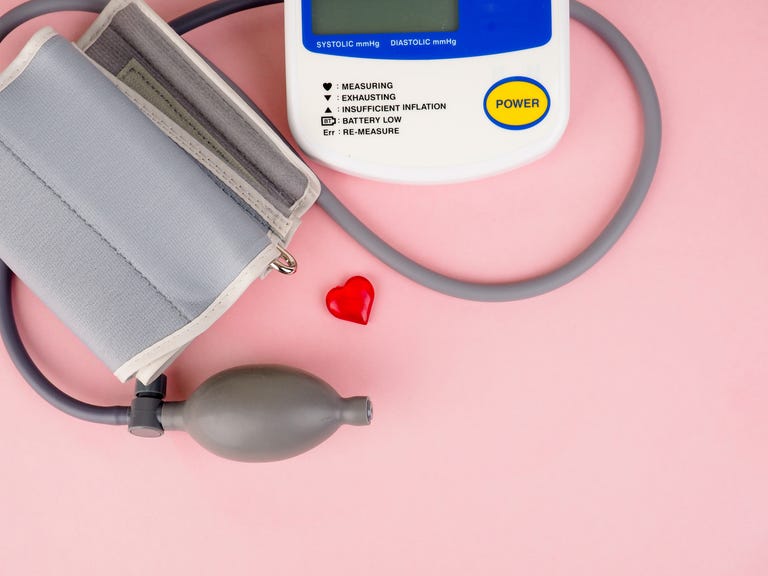
When you get stuck behind a driver who forgot green means go, when your friend cancels dinner plans after you’re already at the restaurant, when the person in front of you scores the last chocolate chip muffin you totally had your eye on—all legit reasons for your blood pressure to skyrocket.
Hopefully these are just short-term elevations, but if not, you’re not alone. Chronic high blood pressure affects about one in five women under 32, according to the National Institutes of Health.
If you have high blood pressure, first, kudos for actually knowing it. It’s often called “the silent killer” because on its own, high blood pressure doesn’t show any symptoms and yet can lead to serious problems, including death.
From there, treating high blood pressure, especially in young women, is normally a combination of lifestyle changes—namely diet, exercise, sleep, and stress management, says Adam Splaver, M.D., a cardiologist with NanoHealth Associates in South Florida.
But, if your lifestyle choices are already pretty optimal and you’re still struggling with high blood pressure, your doctor may prescribe you lisinopril—an angiotensin-converting enzyme (ACE) inhibitor—an one of the most common medications used to manage high blood pressure.
The drug works by helping decrease tightness in blood vessels, allowing blood to flow more smoothy and the heart to pump blood more efficiently. Though the drug is super helpful in controlling high blood pressure, there are still some strange side effects to watch out for.
1. You’re not sick, but you’ve got a cough that just won’t quit.
A “non-productive” cough (i.e., a cough that doesn’t bring anything up, like mucous or blood) is one of the most common side effects of lisinopril, says Splaver. It’s weird and annoying, but it’s not dangerous, he adds. However, if it’s really bothering you, definitely bring it up with your doctor, as there are other meds you can try.
2. You feel exhausted and, weirdly enough, kind of tingly.
Lisinopril can cause your potassium levels to skyrocket, a potentially dangerous side effect, says Splaver. That’s because you won’t necessarily know your potassium levels are rising at first, but if they get high enough, they can make you feel exhausted, numb, or tingly.
Splaver says your doctor should do a routine blood test to check your levels one to two weeks after starting the drug to make sure your body is handling it well. If your doctor hasn’t recommended blood tests yet, or if you start to feel strange, call and get a test scheduled asap.
3. Your head is literally always pounding.
Headaches can happen for a myriad of reasons, but if you develop an unrelenting headache, it may be due to the lisinopril. Headaches are the most commonly reported side effect of the drug, according to the NIH. If they’re mild or go away on their own, don’t worry about it. But if they persist, it’s time to give your doctor a call, says Splaver.
4. You know (and use) every bathroom in a 2-mile radius.
Lisinopril dilates your arteries—that’s how it works to lower high blood pressure—but this can affect other parts of your body besides your heart, especially your kidneys. If you already have kidney problems or are prone to getting them, this drug can make them worse, says Splaver.
At first, you likely won’t feel any symptoms, but if you notice changes in how frequently you have to pee or what your pee looks like, along with pain when using the bathroom, lower back pain, or other signs of kidney problems, call your doctor right away, he says.
5. You’re having trouble orgasming.
A decrease in sexual ability is one of the top five most commonly reported side effect of lisinopril, according to the NIH. That’s because your sexual response depends a lot on blood flow to your genitals, so anything that messes with your arteries and blood flow can mess up your orgasms, says Splaver. Call your doctor if you feel like the drug is hurting your sex life, as there are other medical options you can try.
6. You feel really dizzy whenever you go from sitting to standing.
You know that feeling when you stand up quickly and the room starts spinning? That’s actually caused by a rapid drop in blood pressure upon standing (a.k.a orthostatic hypotension) and can cause cause you to feel dizzy, nauseous, or even black out.
Lisinopril can bring this on or make it worse if you are already prone to it, says Splaver. If you’re just dizzy, practice standing up really slowly until you regain your equilibrium—and make sure you’re staying hydrated. If you’re actually fainting, however, it’s time to go back in and see your doctor, he adds.
7. Your face swells up unexpectedly.
Swelling around your face and lips (a.k.a. angioedema) is a rare but potentially serious side effect of lisinopril. If the swelling gets bad enough, it can cause your throat or tongue to block you airway, according to the Mayo Clinic.
If you’re going to get angioedema from lisinopril, it’ll most likely happen shortly after taking the first dose. However, it can occur even after weeks of being on the medication, says Splaver. If you experience swelling and difficulty breathing, call 911 immediately.
Source: Read Full Article





